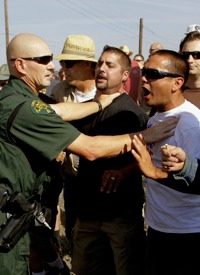
The turmoil began Wednesday night when Longview’s first grain shipment arrived. Led by ILWU President Robert McEllrath, union demonstrators obstructed the shipment by blocking the tracks, which resulted in 19 arrests and a violation of a federal restraining order lodged against the union last week for death threats and physical assaults.
Ironically, the incident stemmed from a union shop hiring a contractor that staffs other union laborers, but the ILWU believes it should still have the right to work at the facility.
The Washington State Patrol and police across several counties in southwest Washington responded to the hostile demonstration. Longview police Chief Jim Duscha said there were no serious injuries, and that most of the protestors retreated to their union hall after sabotaging brake lines and spilling grain at the EGT terminal. "We’re not surprised," Duscha asserted. "A lot of protesters were telling us this is only the start."
An affiliate of the American Federation of Labor and Congress of Industrial Organizations (AFL-CIO), the ILWU is a labor union representing dock workers on the Western Coast, Hawaii, and Alaska, and in British Columbia, Canada. Last week, in a September 1 letter sent to all Longshore Locals, McEllrath prepped the offensive. Addressing his "Brothers and Sisters," he wrote:
ILWU longshoremen work at every grain export facility in the Pacific Northwest — Seattle, Tacoma, Aberdeen, Portland, Vancouver, and Longview. EGT Development (EGT) has built a $200 million facility on the same site as a previous grain facility where longshoremen worked. That site is directly on Port of Longview property. EGT is attempting to break the master grain agreement and become the first grain export terminal in the Pacific Northwest to operate without ILWU. This constitutes an assault on over 80 years of longshore jurisdiction — an assault that could fundamentally change the dynamics of the relationship within the grain industry as a whole. It is critical to the Longshore Division that this does not happen.
Apparently, aggressive behavior and unreasonable demands are nothing new for the 10,500-strong labor union. In 2003, a two-month West Coast labor dispute pitted the ILWU against the Pacific Maritime Association (PMA), an organization that represents dock employers in labor agreements, specifically with the ILWU. At that time, though the law permits employers to hire non-union workers, except for management, non-union workers were virtually nonexistent on the docks, and threats of violence or actual violence were inevitable consequences of hiring outside the union.
In the dispute, union members insisted that labor-saving technology not be used at the facilities, whether or not the technology would help the facility and the workers as a whole.
The Freeman noted in a February 2003 article that industry-wide union monopolies generated average blue-collar wages for dock workers of $82,000 per year (not counting overtime), while unionized clerks, whose primary job was to track cargo entering and exiting the ports, earned over $118,000 per year, and the dispute was not regarding wages or benefits.
The ILWU pulled the "technology" card — the same card President Obama pulled with his ATM machine comments — arguing that labor-saving technologies were eliminating dock jobs. However, the problem as the management saw it was that West Coast ports were suffering from high costs and falling behind in productivity because they were unable to utilize technologies routinely used elsewhere, particularly in other countries. The Freeman reported further:
The PMA didn’t seek to go as far as computerized cabs. They merely wanted the union to agree to allow clerks to use barcode scanners and hand-held computers, and allow truck drivers and their cargoes to check in to terminals using fast passes similar to those used on toll bridges and roads. It was estimated that these innovations would eliminate about 600 of the 1,200 clerks’ jobs at the 29 ports. The PMA agreed to find alternative dock jobs for the displaced clerks at no cut in pay, and to downsize through attrition, not immediate dismissals. Indeed, the actual number of jobs on the docks would almost certainly increase as modernization increased the volume of cargo passing through the ports.
The ILWU had no interest in a compromise, and insisted that all future jobs actualized from technology changes must be appointed to union workers so that they could maintain their monopoly over all dock labor. The union did accede to some technology changes, but in the end, they were able to maintain their monopoly status. The ILWU President at the time, Jim Spinosa, summed up their cause: "We will fight like hell to keep our jobs."
In regard to the Longview incident, McEllrath concluded his September 1 letter with the following:
The ILWU Coast Longshore Division will not let recent developments interfere in any way with its right to take all necessary and legal steps on behalf of Local 21 to obtain a fair agreement with EGT. We will not permit EGT to undermine the grain export industry or further deteriorate the working conditions in Longview.
It appears McEllrath’s loyal group of followers answered his call, as they took "all the necessary steps" to maintain their jobs, including the use of violence and the debasement of private property. Of course, Teamsters President Jimmy Hoffa’s call for a union "army" and charge to take the Tea Party "SOBs out" may have stirred some inspiration too.
Photo: AP Images



